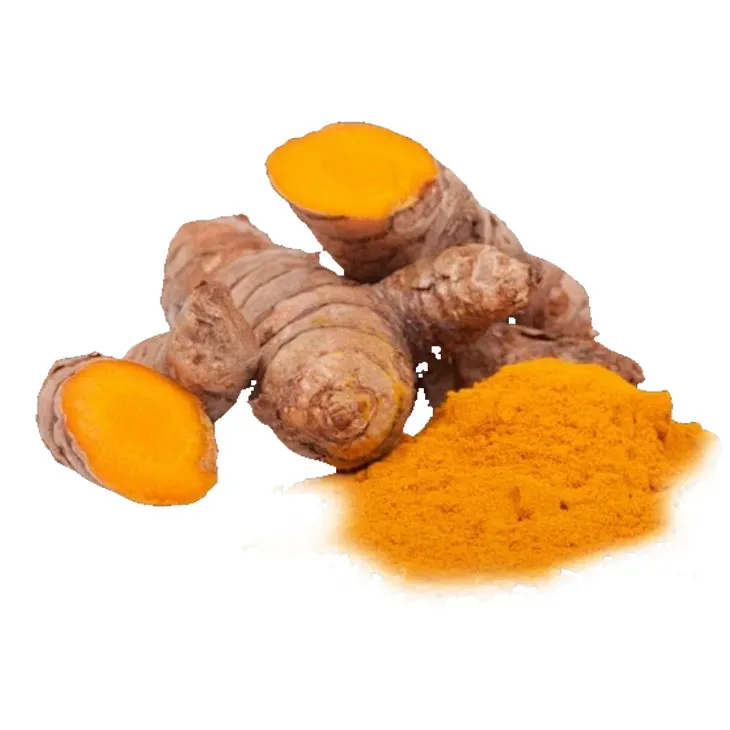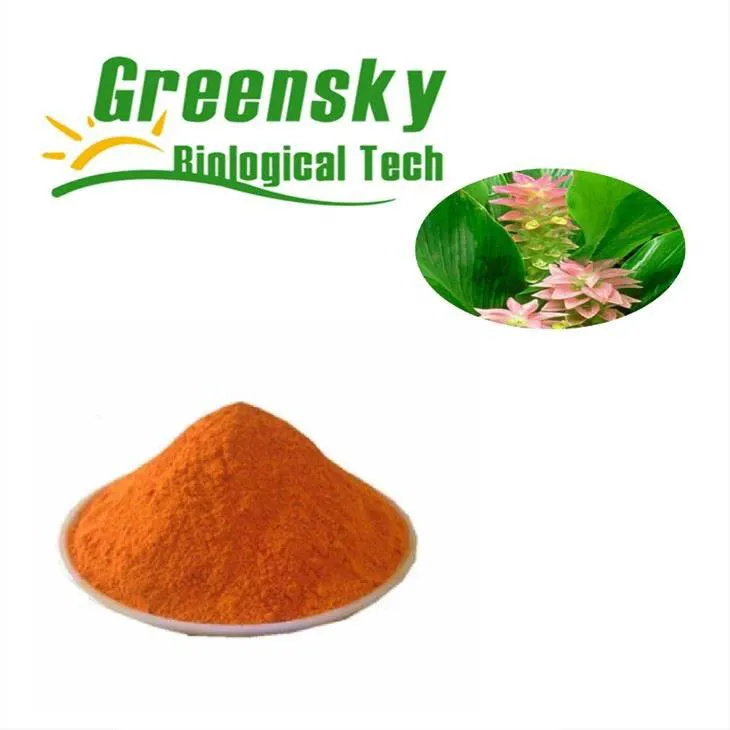- 0086-571-85302990
- sales@greenskybio.com
Curcumin: Benefits, Uses and Possible Side Effects
2024-11-12

1. Introduction to Curcumin
Curcumin is a natural polyphenolic compound that is derived from turmeric (Curcuma longa), a plant native to South Asia. Turmeric has been used for centuries in traditional medicine, particularly in Ayurvedic and Chinese medicine, for its various health - promoting properties. Curcumin is responsible for the bright yellow color of turmeric and has been the subject of extensive scientific research in recent years due to its potential therapeutic applications.

2. Health Benefits of Curcumin
2.1 Anti - Inflammatory Properties
One of the most well - known benefits of curcumin is its anti - inflammatory effect. Inflammation is a natural response of the body to injury or infection, but chronic inflammation can lead to various diseases such as arthritis, heart disease, and cancer. Curcumin has been shown to inhibit the activity of various inflammatory mediators in the body, including cytokines, chemokines, and enzymes such as cyclooxygenase - 2 (COX - 2) and lipoxygenase (LOX). By reducing inflammation, curcumin may help to relieve pain and improve symptoms in conditions such as osteoarthritis and rheumatoid arthritis.
2.2 Antioxidant Properties
Curcumin also exhibits strong antioxidant activity. Antioxidants are substances that can neutralize harmful free radicals in the body. Free radicals are unstable molecules that can cause oxidative stress, which is associated with aging, cancer, and neurodegenerative diseases. Curcumin can scavenge free radicals and enhance the activity of the body's own antioxidant enzymes, such as superoxide dismutase (SOD), catalase (CAT), and glutathione peroxidase (GPx). This antioxidant activity may help to protect cells from damage and reduce the risk of chronic diseases.
2.3 Potential Anti - Cancer Effects
Several studies have suggested that curcumin may have anti - cancer properties. It has been shown to inhibit the growth and proliferation of cancer cells in vitro and in vivo, and may also induce apoptosis (programmed cell death) in cancer cells. Curcumin can target multiple signaling pathways involved in cancer development, including those related to cell cycle regulation, angiogenesis, and metastasis. However, more research is needed to fully understand its potential as a cancer treatment and whether it can be used in combination with existing cancer therapies.
2.4 Benefits for Heart Health
Curcumin may also be beneficial for heart health. It can help to lower cholesterol levels by inhibiting the synthesis of cholesterol in the liver and increasing the uptake of cholesterol by cells. It may also reduce blood pressure by relaxing blood vessels and improving endothelial function. In addition, curcumin's anti - inflammatory and antioxidant properties may help to prevent the development of atherosclerosis, a condition characterized by the buildup of plaque in the arteries.
2.5 Effects on Brain Health and Neurodegenerative Diseases
There is growing evidence that curcumin may have positive effects on brain health and may be useful in the prevention and treatment of neurodegenerative diseases such as Alzheimer's and Parkinson's disease. Curcumin can cross the blood - brain barrier and has been shown to reduce the accumulation of amyloid - beta plaques in the brain, which are a hallmark of Alzheimer's disease. It may also protect neurons from oxidative stress and inflammation, and improve cognitive function.
2.6 Digestive Health Benefits
Curcumin has been used traditionally to promote digestive health. It can stimulate the production of bile, which helps in the digestion and absorption of fats. It may also have a protective effect on the gut lining, reducing inflammation and preventing leaky gut syndrome. In addition, curcumin has been shown to have antimicrobial properties, which can help to combat harmful bacteria in the gut.

3. Uses of Curcumin
3.1 Dietary Supplement
Curcumin is widely available as a dietary supplement in the form of capsules, tablets, or powders. People often take curcumin supplements to support their overall health and well - being, especially those who are interested in its anti - inflammatory, antioxidant, or other potential health benefits. However, it is important to note that the quality and bioavailability of curcumin supplements can vary widely, so it is advisable to choose a reputable brand.
3.2 Therapeutic Applications
- Arthritis: As mentioned earlier, curcumin's anti - inflammatory properties make it a potential treatment for arthritis. Some studies have shown that curcumin supplements can reduce pain and improve joint function in patients with osteoarthritis and rheumatoid arthritis.
- Digestive Disorders: Curcumin may be used to treat various digestive disorders such as inflammatory bowel disease (IBD), irritable bowel syndrome (IBS), and ulcers. It can help to reduce inflammation in the gut and promote the healing of damaged tissues.
- Skin Conditions: Curcumin has also been investigated for its potential use in treating skin conditions such as psoriasis and acne. Its anti - inflammatory and antioxidant properties may help to reduce redness, swelling, and inflammation on the skin.
- Cancer Support: While curcumin is not a substitute for conventional cancer treatments, it may be used as an adjunct therapy to support patients during cancer treatment. It can help to reduce the side effects of chemotherapy and radiation therapy, and may also enhance the effectiveness of these treatments in some cases.

4. Possible Side Effects of Curcumin
4.1 Gastrointestinal Issues
Although curcumin is generally considered safe, some people may experience gastrointestinal side effects such as nausea, diarrhea, or indigestion when taking high doses. These side effects are usually mild and can be alleviated by reducing the dose or taking curcumin with food. However, if the symptoms persist or worsen, it is advisable to consult a healthcare provider.
4.2 Interaction with Medications
Curcumin may interact with certain medications, particularly those that are metabolized by the liver. For example, it may interfere with the metabolism of drugs such as warfarin, a blood thinner, which can increase the risk of bleeding. It is important to inform your doctor if you are taking curcumin supplements, especially if you are also taking prescription medications.
4.3 Allergic Reactions
Although rare, some people may be allergic to curcumin. Allergic reactions can range from mild symptoms such as itching and rash to more severe symptoms such as difficulty breathing and anaphylaxis. If you experience any signs of an allergic reaction after taking curcumin, seek medical attention immediately.

5. Improving the Bioavailability of Curcumin
One of the challenges with curcumin is its low bioavailability, which means that only a small amount of the compound is actually absorbed by the body. To improve the bioavailability of curcumin, several strategies have been developed:
- Combination with Piperine: Piperine, a compound found in black pepper, has been shown to enhance the absorption of curcumin. Some curcumin supplements are already formulated with piperine to increase their effectiveness.
- Liposomal Formulation: Liposomal curcumin is encapsulated in lipid vesicles, which can protect curcumin from degradation in the digestive tract and improve its absorption into the cells.
- Nanoparticle - Based Delivery: Nanoparticle - based delivery systems can also be used to improve the bioavailability of curcumin. These nanoparticles can target specific cells or tissues in the body and release curcumin in a controlled manner.

6. Conclusion
Curcumin is a natural compound with a wide range of potential health benefits. Its anti - inflammatory, antioxidant, and other properties make it a promising candidate for the prevention and treatment of various diseases. However, like any supplement or natural remedy, it is not without potential side effects, and more research is needed to fully understand its mechanisms of action and optimize its use. If you are considering taking curcumin supplements, it is advisable to consult with a healthcare provider first, especially if you have any underlying health conditions or are taking medications.
FAQ:
What are the main health benefits of curcumin?
Curcumin offers several important health benefits. It has anti - inflammatory properties, which can help reduce inflammation in the body. This is beneficial for conditions like arthritis. It also has antioxidant properties, which can combat free radicals and protect cells from damage. Additionally, it may play a role in improving digestive health and potentially has other positive effects on various body systems.
How is curcumin used in treating arthritis?
Curcumin may help in treating arthritis due to its anti - inflammatory nature. It can potentially reduce the inflammation in the joints, which is a key factor in arthritis pain and discomfort. It might work by interfering with the inflammatory pathways in the body. However, while it shows promise, it is often used as a complementary approach and more research is needed to fully understand its effectiveness in arthritis treatment.
Can curcumin improve digestive disorders?
Yes, curcumin has the potential to improve digestive disorders. It may help in reducing inflammation in the digestive tract. It can also play a role in enhancing gut health by interacting with the gut microbiota. Some studies suggest that it may be beneficial for conditions such as irritable bowel syndrome, but further research is required to determine its full impact on different digestive disorders.
What are the possible side effects of curcumin?
Some possible side effects of curcumin include gastrointestinal issues such as nausea, diarrhea, or an upset stomach, especially when taken in high doses. In some cases, it may also cause allergic reactions in individuals who are sensitive to it. However, these side effects are not common and often depend on factors such as the form of curcumin taken and the individual's overall health.
How is curcumin derived from turmeric?
Curcumin is a compound found in turmeric. Turmeric is a plant, and curcumin is extracted from it through various methods. One common method involves using solvents to isolate the curcumin from the other components of turmeric. The extracted curcumin can then be used in various forms such as supplements or incorporated into other products for its beneficial properties.
Related literature
- The Therapeutic Potential of Curcumin: A Review of Clinical Trials"
- "Curcumin: A Multifaceted Anti - inflammatory Agent with Potential for Arthritis Management"
- "The Role of Curcumin in Digestive Health: Current Research and Future Perspectives"
- ▶ Hesperidin
- ▶ Citrus Bioflavonoids
- ▶ Plant Extract
- ▶ lycopene
- ▶ Diosmin
- ▶ Grape seed extract
- ▶ Sea buckthorn Juice Powder
- ▶ Fruit Juice Powder
- ▶ Hops Extract
- ▶ Artichoke Extract
- ▶ Mushroom extract
- ▶ Astaxanthin
- ▶ Green Tea Extract
- ▶ Curcumin
- ▶ Horse Chestnut Extract
- ▶ Other Product
- ▶ Boswellia Serrata Extract
- ▶ Resveratrol
- ▶ Marigold Extract
- ▶ Grape Leaf Extract
- ▶ New Product
- ▶ Aminolevulinic acid
- ▶ Cranberry Extract
- ▶ Red Yeast Rice
- ▶ Red Wine Extract
-
Kupilu Extract
2024-11-12
-
Coix Seed Extract
2024-11-12
-
Hericium erinaceus extract powder
2024-11-12
-
American Ginseng Root Extract
2024-11-12
-
Red Vine Extract
2024-11-12
-
Polygonum Cuspidatum Extract
2024-11-12
-
Phellodendron Extract
2024-11-12
-
Plantain extract
2024-11-12
-
Nettle leaf extract
2024-11-12
-
Beetroot Powder
2024-11-12





















